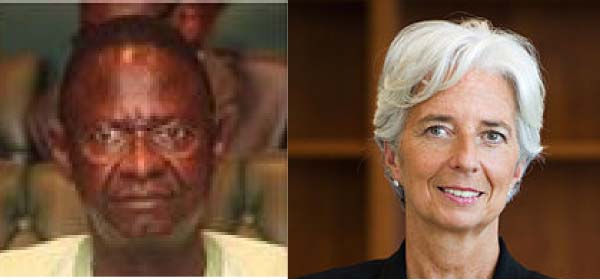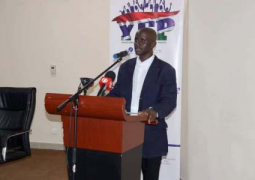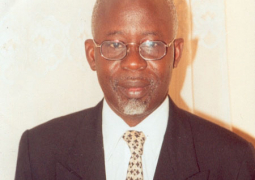
This was stated in the Maputo Joint Declaration Africa Rising: A Shared Vision for Sustained Growth and Prosperity issued at the end of the two-day regional meeting. The declaration continued:
“An increasing number of countries in sub-Saharan Africa have registered strong economic performance, reflecting skillful macroeconomic policymaking, stronger institutions, increased aid, and higher investment in both human and physical capital.
“But in many countries, the benefits of this growth are not well-shared, there remain wide infrastructure gaps, and job creation falls short of expectations.
“The drive towards structural transformation and diversification, combined with a young, dynamic population, offers an opportunity to accelerate progress with poverty reduction, inclusive growth and job creation.
“African Ministers and Governors and the IMF Managing Director agreed to further strengthen the partnership between the Fund and its African membership and respond to the evolving needs of the sub-continent.
“Policy dialogue and capacity building will reflect the ambitious agenda aimed at: upholding macroeconomic stability with policy actions designed to foster structural transformation and sustain strong and inclusive growth; overcoming fragility; ensuring adequate financing for Africa’s development; and building institutional capacity, including in human resources.
“The engagement will take into account the different needs of the African membership, ranging from countries facing challenges of fragility and conflict, to middle-income and emerging market economies.
“African Ministers and Governors and the IMF Managing Director shared the imperative of addressing Africa’s large infrastructure gap. Financing Africa’s infrastructure development will require innovative approaches, involving both the public and private sectors.
“The ongoing reform of the IMF debt limits policy should seek to provide countries with enhanced flexibility in program design to utilize a wider range of financing options while preserving hard-won debt sustainability, which has served the continent well in the face of the global financial turbulence of recent years.
“African Ministers and Governors and the IMF Managing Director agreed to follow up during the Annual and Spring Meetings to take stock of progress towards the objectives and commitments reflected in the Maputo Joint Declaration.
Fostering inclusive growth and structural transformation
“To ensure that future economic growth is inclusive, policies need to aim at job creation and diversification. Progress in economic and social indicators has often been accompanied by widening income inequality and has not generated sufficient employment opportunities for the young and growing population.
“Laying the ground for the region’s meaningful structural transformation requires policy actions on two main fronts. The first is the creation of an enabling environment for a vibrant private sector to generate jobs and sustain growth, which includes the development of deeper financial markets and profitable investment opportunities.
“The second is continued public investment in growth-enhancing infrastructure, most notably in transport and energy, while being mindful of debt sustainability considerations. Both will require building capacity and institutions, investing in human capital development and strengthening public sector efficiency.
“Ministers and Governors welcomed the IMF’s recent work on policy actions and prerequisites for economic diversification and structural transformation in low income countries.
“They encouraged the institution to maintain this agenda and to reflect key insights emanating from it in its policy advice in the context of surveillance, program, and capacity building activities. In particular, they agreed that:
• Policies need to be designed in such a way to ensure that a surge in growth can also spur structural transformation. If the recent record of high growth is to be sustained in the coming years, countries need to improve productivity in areas such as agriculture that currently dominate economic activity and employment, as well as to engage in new higher productivity activities such as industry and services. This offers by far the most effective way of increasing employment opportunities for the younger generation that is set to join the work force in the coming years. Stronger market links for farmers, more reliable income streams and better job opportunities are also critical for poverty reduction. Better aligning macroeconomic policies with the dual objective of creating jobs and delivering social and economic services is vital for political stability and the overall success of countries’ development programs.
• A modern infrastructure is needed to attract profitable investment and diversify economic activity. The continent still faces a significant infrastructure gap, notably in transport and energy. Addressing this gap requires innovative financing solutions, including at the regional level, and the private sector will need to play a key role. Public sectors also have an important part to play, notably by ensuring high-quality public investment management, a transparent treatment of risks, and vigilance regarding fiscal and debt sustainability.
• Deeper and broader financial sectors are essential to sustaining growth and making it more inclusive. Small and medium-size enterprises represent the fabric of Africa’s private sector, but often lack suitable financing opportunities in shallow financial markets. Several African countries have successfully applied advances in information and communication technology to foster innovative, affordable and reliable mobile banking services. But in many others, the cost of capital remains high and financial sectors are inaccessible to a large segment of the population. Ministers and Governors underscored the importance of further promoting financial intermediation and improving access to financial services to support private sector development.
• Sub-Saharan Africa will need to redouble efforts to harness the opportunities offered by its abundant natural resources and ensure that their fruits are equitably shared. In several countries, natural resources may unlock significant revenue streams to address critical infrastructure and social needs. But there are challenges in formulating macroeconomic policies that maintain competitiveness and manage volatility while developing sound institutions. Ministers and Governors reaffirmed their commitment towards transparent fiscal frameworks for prudent resource management. They welcomed continued IMF support on fiscal frameworks for extractive industries, and hoped for the Fund’s advocacy to help address base erosion and profit shifting.
“Ministers and Governors and the Managing Director agreed that addressing these challenges will require close cooperation between the Fund and its member countries, and a systematic engagement with the broad range of stakeholders active in the region, including multilateral institutions, development partners and regional bodies.
“Recognizing the contribution of systematic IMF interactions with the WAEMU and CEMAC currency unions, they invited the Fund to further support regional integration efforts across Africa."
Overcoming fragility
“Conflict and violence still represent important barriers to development in some countries and regions, with the significant human and economic costs that this entails.
“Ministers and Governors and the Managing Director underlined the overriding importance of peace and security for sustained economic and human development.
“They noted that there have been success stories over the past decade, which have shown that, in an environment of political stability, pursuing sound economic policies and building stronger institutions can lead to durable economic stability and decisive progress in human development. Experience suggests that:
• Political economy considerations are of paramount importance in situations of fragility. African Ministers and Governors welcomed the engagement of the IMF with fragile states and its valuable contribution towards rebuilding resilient institutions and administrative capacity. They underlined the importance of addressing political economy challenges, including by identifying quick wins and protecting the most vulnerable in fragile situations.
• Ministers and Governors and the Managing Director agreed that economic policies need to be tailored to the country-specific circumstances and require flexibility. In an environment of weak institutional capacity or recovering from conflict, economic policy implementation inevitably takes more time, which would need to be reflected in IMF advice, policies, and practices.
• Ministers and Governors expressed their appreciation for the Fund’s new Rapid Credit Facility, which had served well to assist countries emerging from conflict. They called on the Fund to safeguard the core characteristic of the facility to provide quick and unconditional financial support in times of need.
Financing Africa’s development
“Sub-Saharan Africa will continue to face extensive financing needs to secure sustainable and inclusive growth, while safeguarding hard-won gains in debt sustainability.
“The magnitude of the region’s development challenges, the extent of its infrastructure gap and the impact of its demographics on social investment needs call for reliable financing sources."
• African Ministers and Governors recognized that macro-economic stability has served the region well and has enabled countries with sound policies to tap new sources of finance. They reaffirmed their commitment to strengthen domestic resource mobilization, welcoming IMF support for capacity building in the area of tax policy and public financial management, which has enabled them to create fiscal space for inclusive growth. They emphasized that access to IMF concessional resources remains critical for many countries in sub-Saharan Africa that face protracted balance of payments problems. They welcomed efforts to place the availability of concessional resources under the PRGT on a permanent self-sustaining basis, and urged the Fund to ensure that access to these resources could increase in line with countries’ needs.
“As fast-growing countries become increasingly integrated in the world economy, their exposure to global volatility and shocks also increases.
“Accordingly, African Ministers and Governors urged the Fund to continue to refine its lending toolkit for Africa.
“They called on the Fund to provide increased financing from its general resources for sub-Saharan Africa, where warranted, and stressed that frontier economies should have access to insurance-type instruments, such as the Precautionary Liquidity Line, on equal footing with other Fund members.
“African Ministers and Governors called on the Fund to move forward expeditiously with the reform of its debt limits policy. They underlined that the development challenges faced by many countries in sub-Saharan Africa, notably the large infrastructure gap, called for making it more flexible.
“The Managing Director and the Ministers and Governors agreed that it will be important that the policy provides for debt limits that are tailored to individual country circumstances. The policy should seek to accommodate financing for critical investment, while maintaining hard-won gains on debt sustainability.
“They also agreed that building capacity in national debt management offices is a priority to ensure optimal use of debt-financing and its alignment with long-term fiscal and macroeconomic stability.
“They expressed the hope that agreement on the reform could be reached before the 2014 Annual Meetings.
“African Ministers and Governors noted that the region has weathered, but not been immune to, the fallout from the global financial crisis.
“Welcoming the work of the Fund on spillovers, they called on the Fund to continue monitoring the impact of global developments on sub-Saharan Africa and advocate for the region in global forums debating cross-border taxation and financing issues.
“Given the Fund’s central role in promoting global financial stability and increasing integration of sub-Saharan African frontier countries in international financial markets, they called for a strengthening of the global financial architecture, including improved surveillance of systemic risk; greater international coordination of macro-prudential responses to systemic risk; cross border arrangements for financial regulation; and additional funding for liquidity support and external adjustment, particularly in low-income African countries."
Building institutions and human capital
“Strong institutions and the continuous development of human capital are critical to successful economic and social development.
“African Ministers and Governors paid tribute to their close collaboration with the Fund in the area of training and technical assistance.
“They welcomed the expansion of the Regional Technical Assistance Centers and looked forward to the official launch of the Africa Training Institute.
“They called on the IMF to further step up its efforts to draw lessons from successful experiences within and outside Africa, which could serve as valuable guideposts for the African membership.
“African Ministers and Governors and the IMF agreed to continue their close cooperation to invest in human capital and capacity building, including by providing adequate country-level technical assistance, facilitating peer-to-peer learning, and creating an online community of practice.”
Source: IMF Communication Department




